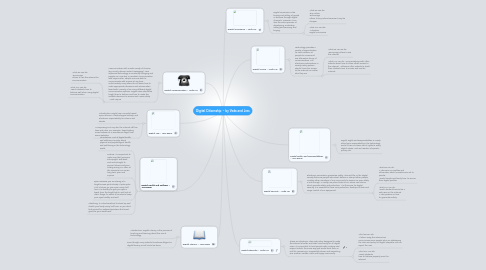
1. Digital Health and Wellness ~ Jess Raper
1.1. Introduction: Part of digital health and wellness is mainly about physical and psychological health and well-being in the technology world.
1.2. Posture: It is important to make sure that someone sits upright, with back and neck straight to prevent strains and pain. Sitting wrong in a chair at the computer can cause long term pain and injuries.
1.3. Eyes: Because you are staring at a bright screen quite closely, it puts quite a lot of strain on your eyes. Every half hour, it is healthy to give you eyes a break from the bright lights, and look at other things for about 5 minutes to keep your eyes healthy and well.
1.4. Stretching: It's also beneficial to stand up and stretch your body every half hour, so you don't find yourself in awkward positions that aren't good for your back/neck.
2. Digital Law ~ Jess Raper
2.1. Introduction: Digital Law is mainly based upon ethics in a technological society, and electronic responsibility for actions and deeds.
2.2. As surprising as it may be, the internet still has laws and rules. For example, downloading music/videos etc is sometimes illegal from some websites.
3. Digital Literacy ~ Jess Raper
3.1. Introduction: Digital Literacy is the process of teaching and learning about the use of technology.
3.2. Even though many schools have been diligent in digital literacy, much has to be done.
4. Digital Communication ~ Veda Lay
4.1. Communication with a wide variety of choices (eg. email, phones, instant messaging). New improved technology is constantly changing and people can now stay in constant communication with anyone else. People are now able to communicate with anyone at any time. Unfortunately many users do not know how to make appropriate decisions and actions when faced with a variety of so many different digital communication options. Digital users should be taught how to behave and how to make the suitable decisions to ensure each users safety. -Veda Lay 8E
4.1.1. What we can do: -Encourage others to use the internet for communication
4.1.2. What PLC can do: -Teach students how to behave well when using digital communication
5. Digital Access ~ Veda Lay
5.1. Technology provides a variety of opportunities for vast numbers of people to access and use alternative forms of communication. Full electronic participation in society. Every person should have fair access to the internet no matter who they are.
5.1.1. What we can we do: -Encourage others to use the internet
5.1.2. What PLC can do: -Have meetings with other schools about how to allow others access to the internet. -Influence other schools to teach their students how to access and use the internet.
6. Digital Security ~ Veda Lay
6.1. Electronic precautions guarantee safety. Like real life, in the digital society there are people who steal, deface or disrupt other people. Trusting other members of our community to ensure our own safety is not enough. In reality, we place locks on our doors and alarms which provide safety and protection. It is the same for digital security. It is essential to have virus protection, backups of data and surge control of our equipment.
6.1.1. What we can do: -Make sure our profiles and information about ourselves are set to private. -Teach friends and family how to secure their digital profiles
6.1.2. What PLC can do: -Teach students how to be a safe user on the internet -Make posters on how to guarantee safety
7. Digital Etiquette ~ Veda Lay
7.1. These are electronic rules and policy designed to make the internet a better and safer community for all digital users. It is important to treat people with courtesy and respect online, the same way you would treat them in real life. Becoming a responsible citizen and respecting one another creates a safe and happy community.
7.1.1. What we can do: -If when using the internet we come across some people who are disobeying the rules and policy of digital etiquette, we can report the user
7.1.2. What PLC can do: -Teach students how to behave properly over the internet
8. Digital Rights and Responsibilities ~ Jess Raper
8.1. Digital Rights and Responsibilities is mainly about your responsibility in the technology world. There is a basic set of rights to every digital citizen, such as freedom of speech, privacy etc.
9. Digital Commerce ~ Veda Lay
9.1. Digital commerce is the buying and selling of goods or services through digital channels. However it can also the entire process of developing, marketing, selling and servicing and buying.
9.1.1. What we can do: -Buy online -Encourage others to buy online because it may be cheaper
9.1.2. What PLC can do: -Advertise Digital Commerce
